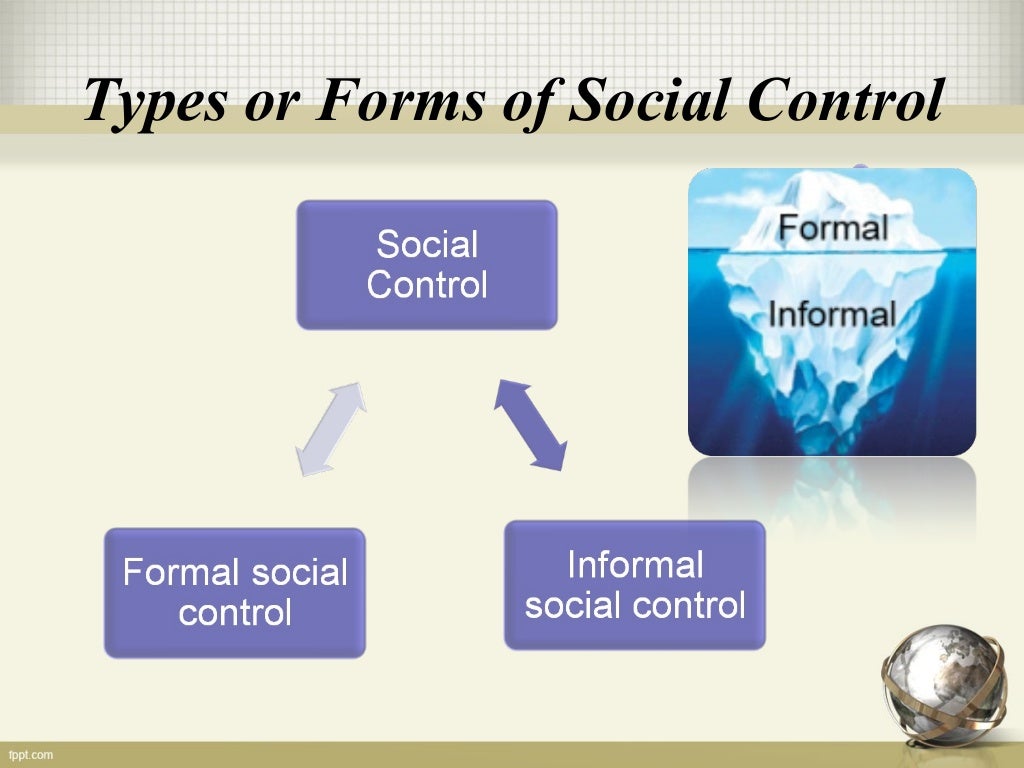Imagine a bustling marketplace, overflowing with vendors and shoppers. Amidst the chaos, someone attempts to deceive a customer, leading to a heated argument. Suddenly, a security guard intervenes, restoring order and preventing the conflict from escalating. This seemingly simple scenario highlights the critical role of social control institutions in our lives. These institutions, whether formal or informal, are the unseen forces that shape our behavior, maintain order, and ensure the smooth functioning of society.

Image: www.slideshare.net
While we often take them for granted, social control institutions are present in every aspect of our lives, from the laws we abide by to the norms and values we internalize. Understanding these mechanisms of influence is crucial for navigating the complex social world we inhabit, fostering a deeper understanding of ourselves and others.
Defining Social Control Institutions
The Framework of Order
Social control institutions, in their simplest definition, are any structures or practices that aim to regulate individual and group behavior. They can be formal, like the legal system and educational institutions, or informal, such as family, religion, and cultural norms. The overarching goal of these institutions is to maintain stability and order within society, ensuring that individuals conform to established rules and standards.
These institutions exert influence through a variety of means, including rewards, punishments, and social pressures. They may enforce rules explicitly through laws and sanctions or subtly through socialization and cultural expectations. While often perceived as a rigid framework of control, social control institutions can also foster cooperation, promote shared values, and contribute to the common good.
The Evolution of Social Control: From Ancient Times to the Modern Era
The concept of social control, in its various forms, has been present throughout human history. In ancient civilizations, religious institutions played a vital role in shaping moral codes and enforcing social norms. As societies evolved, legal systems emerged, formalizing the mechanisms of control through codified laws and punishments. The development of modern nation-states further expanded the scope of social control, integrating institutions like education, healthcare, and the media into the fabric of societal governance.
The technological advancements of the 20th and 21st centuries also introduced new dimensions to social control. The rise of mass media, social networks, and surveillance technologies has created unprecedented opportunities for influencing public opinion and shaping individual behavior. This has led to ongoing debates about the limits of social control and the potential for both positive and negative consequences in the digital age.

Image: helpfulprofessor.com
Understanding Social Control Mechanisms
Formal and Informal Systems at Work
Social control institutions operate through a combination of formal and informal mechanisms. Formal institutions, like the legal system, employ explicit rules and sanctions, with clear consequences for violations of these rules. The legal system, with its courts, police, and laws, sets a clear framework for acceptable behavior. Individuals who break the law risk facing penalties, ranging from fines to imprisonment.
Informal social control, on the other hand, operates through less overt means. It includes social norms, cultural values, and informal sanctions, such as social ostracism or gossip. These mechanisms often rely on a shared understanding of what is considered acceptable behavior within a specific community or group. Individuals who deviate from these norms may face social disapproval, reduced social capital, or even exclusion from their social circles.
Contemporary Trends and Developments: The Shifting Landscape of Social Control
The Rise of Global Social Control and Technology’s Impact
In recent years, we have witnessed a growing interconnectedness across societies, fueled by globalization and rapid technological advancements. This interconnectedness has also translated into a shift in the nature of social control. Traditional social control mechanisms are now intertwined with transnational influences, globalized ideas, and technologies that transcend national boundaries.
Social media platforms, for instance, have emerged as powerful forces in shaping public opinion and disseminating information across the globe. While these platforms can facilitate collective action and social movements, they also present new challenges, such as the spread of misinformation, online harassment, and the potential for manipulation.
Tips and Expert Advice for Understanding Social Control in Your Life
Navigating the Web of Influence
Being aware of the mechanisms of social control can help you navigate the complex social world more effectively. It’s important to be critical of information sources, identify biases, and question assumptions. Challenge your own perspectives and be willing to engage in meaningful dialogue with those who hold different views.
Furthermore, engaging in activities that promote critical thinking and media literacy can enhance your ability to analyze information and make informed decisions. By developing a deep understanding of the forces that shape our behavior, we can become more informed, resilient, and empowered individuals.
Frequently Asked Questions
Q: What are some examples of social control institutions?
A: Examples can be formal, like the government, police, courts, and schools, or informal, like family, religion, community groups, and social media.
Q: How do social control institutions benefit society?
A: They promote order, maintain stability, protect individual rights, resolve conflicts, and enforce moral codes.
Q: Can social control institutions be misused?
A: Yes, they can be misused to enforce oppressive regimes, suppress dissent, or discriminate against certain groups.
Q: How can I resist harmful forms of social control?
A: Stay informed, critically analyze information, question authority, advocate for your rights, and support organizations that promote social justice.
Social Control Institutions
Conclusion
Social control institutions are an integral part of the social fabric, shaping our behavior, and maintaining order. From laws to norms, these mechanisms of influence wield significant power over us, both individually and collectively. Understanding these institutions and their workings is crucial for navigating the complexities of society and empowering ourselves to make informed choices.
Are you interested in exploring the topic of social control institutions further, perhaps analyzing specific examples or delving into the ethical dilemmas they present? Let’s continue the conversation in the comments below.





